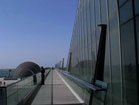
Save and Burn 2004
Distributed by Filmakers Library, 124 East 40th Street, New York, NY 10016; 202-808-4980
Produced by Julian Samuel
Directed by Julian Samuel
DVD, color, 80 min.
College - Adult
Middle Eastern Studies
Date Entered: 07/14/2006
Reviewed by Sheila Intner, Professor Emerita, Graduate School of Library & Information Science, Simmons College GSLIS at Mt. Holyoke, South Hadley, MAOstensibly this is a documentary film about libraries and the roles they have played in various socio-political settings from early times to the present. In reality, however, the film is an expression of opinions and attitudes held by a group of librarians about Middle East politics, mainly anti-Israel and anti-U.S. policy, carefully disguised as a piece about libraries and the preservation of library materials.
First, a word about the technical aspects of the piece: The visuals are good for the most part, especially the well-shot footage of the newly completed library at Alexandria, Egypt, early in the film and, later, the well-paced interviews. Too many scenes, however, display in slow motion. One slo-mo circumnavigation of the Alexandrian library’s new buildings is appealing, but repetitions and slo-mo scenes of library users and other activities are not. The editing is odd. Strange images interrupt the film. Unrelated, unidentified documents, people, and scenes flash on the screen as if the original material was inadvertently filmed over, and special effects are added that do nothing to enhance the material. The audio is less successful. Several interviewees are difficult to comprehend although they speak English, because they speak too softly and swallow their words, or because of strong, unfamiliar accents.
Filmakers’ advertising says, “The film is packed with provocative ideas.” That is an understatement. For instance, Norwegian librarian Erling Bergan says that the establishment of the state of Israel was a bad idea, even if it was prompted by good intentions. Talking about the ineffectiveness of taking up a collection to help rebuild Palestinian libraries, allegedly destroyed in wanton fashion by the Israeli military, he says it would be far better to persuade the United States to stop aiding Israel. Isam al Khafaji, an Iraqi ex-official, intimates that devastation of Iraqi libraries is the fault of the U.S. military, who failed to protect them and still aren’t protecting them.
At the end of the day, the film is neither about libraries nor Middle East politics. It offers bits and pieces about preservation of rare books and manuscripts; about the new Alexandrian library; and about the terrible treatment of Iraqi and Palestinian libraries by the U.S. and Israel, respectively. Biased comments about Middle East politics are generally framed in a library context. Israel and the United States are cast as villains who would, at best, ignore, or, at worst, destroy, painstakingly built repositories of Arab culture.
Save and Burn teaches very little about libraries and librarianship, even about Arabic libraries. It is, however, a good example of how positional arguments can be framed as objective, socially responsible scholarship.
Not recommended.